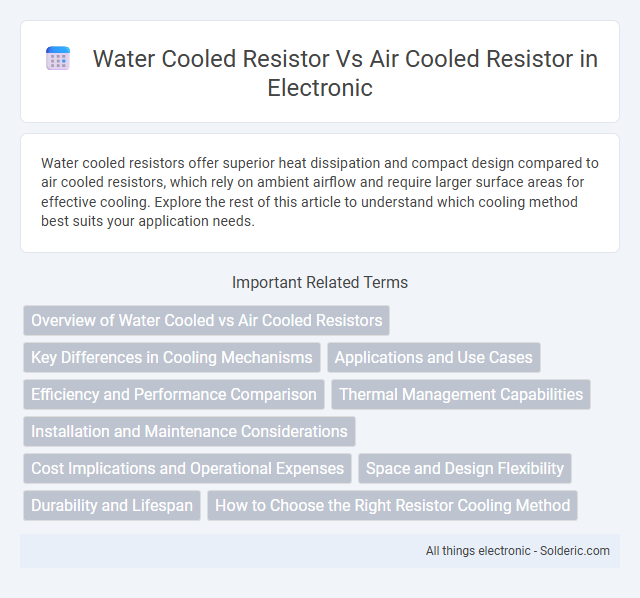Water cooled resistors offer superior heat dissipation and compact design compared to air cooled resistors, which rely on ambient airflow and require larger surface areas for effective cooling. Explore the rest of this article to understand which cooling method best suits your application needs.
Comparison Table
| Feature | Water Cooled Resistor | Air Cooled Resistor |
|---|---|---|
| Cooling Method | Water circulation | Natural or forced air convection |
| Heat Dissipation | High efficiency, suitable for high power | Lower efficiency, suitable for low to moderate power |
| Power Rating | Up to several kilowatts | Typically up to a few hundred watts |
| Size | Compact due to effective cooling | Larger size required for heat dissipation |
| Maintenance | Requires water system upkeep | Minimal, mainly dust removal |
| Cost | Higher initial and operational cost | Lower cost, simpler design |
| Application | High power industrial and testing setups | General low power resistive applications |
Overview of Water Cooled vs Air Cooled Resistors
Water cooled resistors use liquid coolant to efficiently dissipate heat, making them ideal for high-power applications requiring compact design and stable thermal performance. Air cooled resistors rely on airflow for heat dissipation, offering simpler installation and lower maintenance but may require larger surface areas to manage thermal loads effectively. Your choice depends on power requirements, space constraints, and cooling efficiency needed for optimal resistor operation.
Key Differences in Cooling Mechanisms
Water cooled resistors use liquid coolant to efficiently absorb and dissipate heat, offering higher thermal conductivity compared to air cooled resistors that rely on ambient air for heat dissipation. The enhanced cooling mechanism in water cooled resistors enables better temperature control and higher power ratings, making them ideal for high-power applications. Your choice between these depends on factors like heat generation, installation environment, and maintenance requirements.
Applications and Use Cases
Water cooled resistors are ideal for high-power applications such as industrial power supplies, load banks, and brake systems in electric vehicles, where efficient heat dissipation is crucial to maintain performance and prevent overheating. Air cooled resistors are commonly used in low to medium power circuits, electronics testing, and general-purpose heating applications where moderate heat generation can be effectively managed by ambient airflow. Selecting between these resistor types depends on thermal management requirements, power rating, and environmental conditions specific to the use case.
Efficiency and Performance Comparison
Water cooled resistors offer superior thermal management compared to air cooled resistors, enabling higher power dissipation and more stable performance under heavy loads. The enhanced heat transfer efficiency of water cooling reduces thermal resistance, minimizing temperature rise and extending component lifespan. Air cooled resistors typically exhibit lower efficiency in high-power applications due to limited convective heat dissipation and potential overheating risks.
Thermal Management Capabilities
Water cooled resistors offer superior thermal management capabilities by efficiently dissipating heat through liquid circulation, allowing them to handle higher power loads and maintain stable temperatures during prolonged operation. Air cooled resistors rely on ambient airflow and convection, which can limit their cooling efficiency and power rating in high-temperature or high-load environments. You should choose water cooled resistors for applications requiring enhanced heat dissipation and consistent performance under demanding thermal conditions.
Installation and Maintenance Considerations
Water cooled resistors require specialized plumbing and sealed enclosures for installation to prevent leaks and ensure efficient heat dissipation, while air cooled resistors need adequate airflow and unobstructed mounting areas to avoid overheating. Maintenance of water cooled resistors involves regular inspection of cooling circuits for corrosion, leaks, and coolant quality, whereas air cooled resistors demand routine cleaning of fins and fans to maintain airflow and prevent dust buildup. Your choice depends on the facility's capability to manage water cooling systems or preference for simpler air cooling with potentially higher temperature rise.
Cost Implications and Operational Expenses
Water cooled resistors generally have higher initial costs due to the need for specialized cooling systems and installation complexity compared to air cooled resistors. Operational expenses for water cooled resistors can be lower in high-power applications because they provide efficient heat dissipation, reducing the risk of overheating and extending lifespan. Air cooled resistors, while cheaper upfront, may incur higher ongoing maintenance costs and shorter service life when used in high-load environments.
Space and Design Flexibility
Water-cooled resistors offer significant space savings due to their compact design, enabling higher power density in limited areas compared to air-cooled resistors, which require larger enclosures for effective heat dissipation. Your systems benefit from enhanced design flexibility with water-cooled resistors, as they can be integrated into tighter configurations and complex layouts where airflow is restricted. Air-cooled resistors, while simpler to install, often limit placement options due to the necessity of adequate air circulation for cooling.
Durability and Lifespan
Water cooled resistors offer superior durability and longer lifespan compared to air cooled resistors due to their efficient heat dissipation, which reduces thermal stress on components. Air cooled resistors rely on ambient airflow, making them more prone to overheating and resulting in shorter service life under heavy loads. For your applications requiring consistent performance and reliability, water cooled resistors are the preferable choice to ensure extended operational longevity.
How to Choose the Right Resistor Cooling Method
Choosing the right resistor cooling method depends on your resistor's power rating, operating environment, and space constraints. Water cooled resistors offer superior heat dissipation for high-power applications, making them ideal for industrial machinery and environments with limited airflow. Air cooled resistors are simpler and cost-effective for lower power uses, providing adequate cooling in open or well-ventilated spaces, ensuring your system operates reliably without overheating.
Water cooled resistor vs air cooled resistor Infographic

 solderic.com
solderic.com